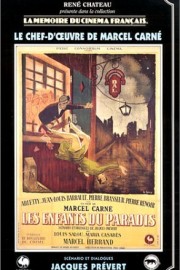Children of Paradise
I began watching Marcel Carne’s “Children of Paradise” in 2017, and I was able to get through the first part of it, “The Boulevard of Crime,” but unfortunately, the disc containing Part 2 of the film never worked, or properly made its way to my house, so I had to wait, and rent the film another way, so that I could give the 3-hour film a proper viewing for this review. It was worth the wait, as Carne’s film keeps you enraptured with its story of actors, romance, crime, and longing.
The film, when it was released in America, was sold as France’s “Gone With the Wind,” and while the setting is very different than that problematic Civil War melodrama, it’s a worthy comparison, as this also follows the love life of a woman who is better at appreciating men from afar than she is in close proximity. That woman is a courtesan named Garance (Arletty), and when we first see her, she is met by an aspiring actor, Frederick Lemaitre (Pierre Brasseur), who will fall immediately for her. He will have competition, though, in a criminal named Lacenaire (Marcel Herrand), who also writes love letters even if he is a cynical human being; an aristocrat, the Count Edouard de Montray (Louis Salou), who will fall in love with her on stage, and take her away when she is implicated in murder; and Baptiste (Jean-Louis Barrault), a mime who turns into one of the most beloved performers in France, and whom is struck by love quickly, and is easy to be pained when he thinks his affection is not reciprocated. All of these lives converge and meet on a street where performers and festivals overflow, and many of them find themselves at the local theatre, Funambules, where they will find success, joy and pain over and over.
Many of the people in Carne’s film, and the script by Jacques Prevert, are based on real people from 19th Century France, and while the film is filled with theatricality and melodrama, it does feel like we are getting something authentic and true. It could be because “Children of Paradise” was made during the German occupation in WWII, and Carne had to work in secret often to get the film made, moving sets to different locations, and even its set designer and composer, both of whom were Jewish, had to work in secret. In many ways, that makes it feel more like a guerrilla indie production than a spectacle on the level of David O. Selznick’s sweeping epic, but while the film stays centered around the lives of these people in this street, and doesn’t really deviate to the larger world away from it, there is something quite epic about the story being told, probably because we always respond to complicated romances in fiction as big and important stories, especially if there is tragedy to be wrung out of it. There is certainly plenty of that here.
Garance is a woman that will ruin many lives throughout the running time of this story, but unlike Scarlett O’Hara, it’s not out of selfishness, but rather, because of the selfishness of the men in her life. The Count admires her beauty, and will do anything for her, but we get the impression that he wants to control her more than love her, to keep her away from men who have greater affection for her. The actor, Frederick, is star struck when they meet on the street at the beginning, but theirs is more of a teenage love that just becomes friendship as it grows older; while there’s much excitement in Frederick when he sees her again after years, and he is now a famous actor, you don’t get the impression of lingering romantic feelings. Lacenaire is the most jilted of lovers, the one who never really had their feelings reciprocated, and has grown bitter, and doesn’t mind ruining lives as a form of vengeance. That leaves Baptiste. The love between Garance and Baptiste is the most genuine of the film, and the most painful to see unravel by circumstances. Although Baptiste will marry another actor, Nathalie (María Casares), and father a child after Garance disappears, the second the couple finds out about Garance’s re-emergence, those old feelings come back fast, and both sides of the marriage do what they can to sate those feelings. That is what Part 2 of “Children of Paradise,” called “The Man in White,” centers on, and the way it unfolds is both love-affirming and heartbreaking for every reason you want it to it. It’s where the epic grandeur of “Children of Paradise” becomes so palatable, and Carne’s film earns its reputation as a great movie romance. It was well worth watching all of it at once- it’s the only way to experience it.










